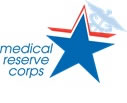QVHD Medical Reserve Corps
 The mission of the Quinnipiack Valley Health District (QVHD) MRC is to engage volunteers to supplement and assist local public health in preparing and responding to emergencies, mass distribution of countermeasures and other public health events of significance.
The mission of the Quinnipiack Valley Health District (QVHD) MRC is to engage volunteers to supplement and assist local public health in preparing and responding to emergencies, mass distribution of countermeasures and other public health events of significance.
The Medical Reserve Corps (MRC) is a national group of volunteers engaging local communities to strengthen public health, build resilience and improve local preparedness response and recovery capabilities through regular trainings and drills. QVHD's MRC Unit provides a pool of resources available to supplement the local emergency responders in Bethany, Hamden, North Haven and Woodbridge.
How do I become a MRC volunteer?
Register as a QVHD MRC Volunteer on the states new volunteer management website: CT Responds
Instructions for registration can be found: here
Learn about volunteer roles in the upcoming COVID-19 Mass Vaccination Process and how you can get involved: here
Shareable volunteer recruitment graphic
Frequently Asked Questions (FAQ's)
Who can volunteer? BOTH Medical AND NON Medical Volunteers (18+)
Health Professionals: The MRC needs practicing or retired Connecticut licensed health care professionals including physicians, dentists, nurses, pharmacists, respiratory therapists, social workers, mental health counselors, health educators, epidemiologists, and paramedics/EMTs. Healthcare providers must have an active Connecticut license in order to practice medicine. Healthcare professionals that do not have a current license may still volunteer in a support role.
Non-Health Professionals: The MRC also needs volunteers for key support roles (e.g. greeters, educators, security, registration, interpreters, pet care and chaplain services).
What are some examples of volunteer activities?
■ Assisting with mass vaccination clinics
■ Interpreting for people with limited English
■ Answering phone in an emergency call center
■ Assisting with triage and client care in town operated emergency shelters
■ Community Outreach at Events
■ Staffing first aid stations at community events
What will be required of volunteers?
Volunteers may be called upon during a public health crisis (e.g. natural disaster, mass casualty event, disease outbreak, extreme weather event) but are not required to respond. In order to be eligible to respond to a disaster as a MRC volunteer, individuals must complete a set of initial trainings, orientation and a background check. Optional trainings and activities are offered every quarter. For more information, check out the National MRC website.
Incident Command System (ICS)
It is recommended that all volunteers take the ICS-100 course as this is the structure that is used in an emergency event. An ICS enables integrated communication and planning by establishing a manageable span of control. It basically allows for you to receive instructions from a single person as well as report to a single person. You can access this course through the link below, however it is suggested that you set up an account on the MRC-train site and take it through there. On the MRC-train site, search ICS-100 and choose the ICS provided by FEMA. Once it comes up, click register and then launch the course. (It takes you to the same link below, but will track your progress for you.) Click here to complete the ICS-100 Course
WHAT IS ESF?
ESF stands for Emergency Support Function. There are 15 ESFs that have been established by the federal government. The one that applies to public health is ESF 8, “Public Health and Medical Services.” The State of CT, Department of Emergency Management and Homeland Security, (DEMHS) has divided the state of CT into 5 Regions. Each region has an ESF 8 committee. Quinnipiack Valley Health District is located in Region 2. Region 2 ESF8 is a group of agencies with public health and medical emergency response responsibilities within a CT designated area for pre-incident planning and coordination of agency efforts throughout an incident. They are not responsible for command and control of an incident, but are a resource tool for the Incident Commander.

